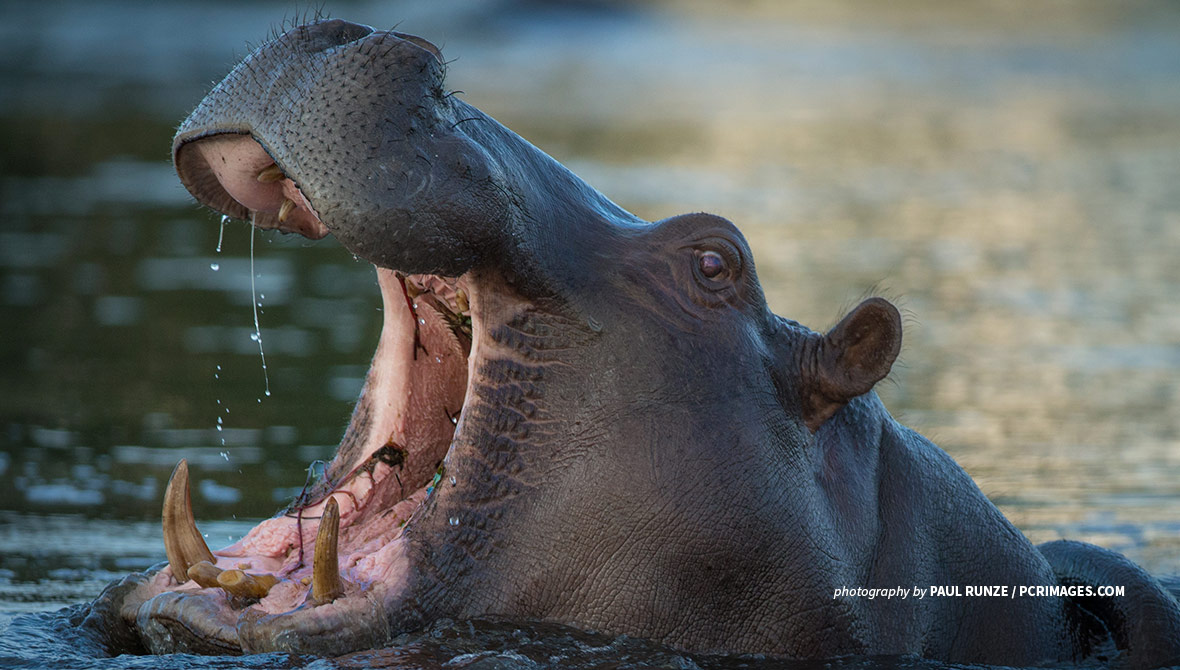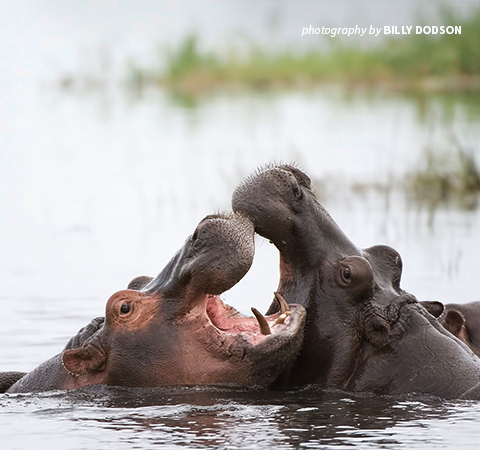World Hippo Day: Africa’s hippos targeted for illegal ivory trade

Hippos are large ivory-bearing mammals at risk of decline due to unregulated trade in hippo teeth and hippo parts
The hippo has two habitat requirements: waters deep enough to cover them entirely and nearby grasslands where they can graze. With the growing demand and competition for water resources, plus rising rates of land conversions for infrastructure development, human settlement, and agriculture, hippos are in a very precarious position.
Habitat loss is not the only threat to the long-term survival of the hippopotamus. Illegal and unregulated hunting for hippo skin, meat, and especially its ivory-bearing teeth, is emerging as a significant driver of population declines in range states across sub-Saharan Africa. Though international trade in these hippo products is regulated, it can be the platform that facilitates illegal offtake of species from source countries if mismanaged.
Additionally, the ban on the international trade of elephant ivory — coupled with national legislation outlawing domestic trade in demand countries like China, Hong Kong, and most recently, the United Kingdom — may further endanger hippos. The U.K.’s Ivory Act 2018 does not provide protections for non-elephant ivory, putting ivory-bearing species like the hippo, warthog, and walrus at risk. A study exploring the impacts in the months after the ivory ban came into force in June 2022 warned that online sellers might attempt to pass illegal or unlicensed ivory as hippo, a legal alternative.
Hong Kong, which has been an international hub for legal and illegal wildlife trade, banned commercial trade in elephant ivory in January 2022. Before the ban, hippo teeth were a common find among the illicit elephant tusks, pangolin scales, and rhino horns intercepted by customs officials at Hong Kong’s ports. Not only are the incisors and canines of hippos easier to smuggle, they are significantly cheaper and readily used in the carving industry. Over the years, millions of consumers have traveled from mainland China to take advantage of the lower prices on luxury wildlife items, and this influx grew with its domestic ivory ban taking effect in January 2018.
Even before China instituted the closure of domestic ivory markets and its ivory carving industry, African hippo ivory was in high demand. Up to 90 percent of the 771,000 kg of hippo ivory traded internationally since 1975 was imported by Hong Kong. Almost three-quarters of this ivory originated from just two East African countries — Tanzania and Uganda — but trade with Malawi, Zambia, and Zimbabwe is also on the rise.
Investigations into international trading patterns of endangered wildlife species in 2018 revealed vast discrepancies in the amount of hippo ivory leaving source countries and the volume declared on entry in Hong Kong. Scientists at the University of Hong Kong compared Uganda’s export permits and import receipts from 1995 to April 2016, estimating the volume of unaccounted hippo teeth to be just over 14,200 kg. This volume of ivory is the equivalent of 2 percent of the continental hippo population currently estimated at 115,000 - 130,000 individuals.

The hippopotamus is classified as vulnerable despite growing demand for hippo ivory
Hippos receive less international protection against the ivory trade
In 2021, the African savanna elephant and forest elephant were reclassified as endangered and critically endangered, respectively, on IUCN’s Red List of Threatened Species. Hippos are listed as vulnerable and are thereby relegated to a lower international protection status even though they are also increasingly sought after as a source of ivory and face habitat loss compounded by climate change.
Listed on Appendix II of the Convention on International Trade in Endangered Species of Wild Fauna and Flora (CITES), hippos are primarily protected by hunting regulations and trade quotas that are not standardized across African range states whereas elephants receive higher levels of international protection and attention because of their Appendix I status. So far, Uganda is the only source country to ban trade in hippo teeth — but the trade volume study suggests that the 2014 moratorium simply shifted trade to the black market.
At the CITES 19th Conference of the Parties in Panama last November, 10 African countries proposed to uplist the hippopotamus to Appendix I, but the proposal was not approved due to several reasons, among them inadequate supporting data on continental hippo populations. Enhanced collaboration between hippo range states and the international community will benefit the species immensely.
AWF’s efforts against illegal wildlife trade and trafficking cover all at-risk African wildlife species, including the hippo. Our Canines for Conservation program trains sniffer dogs and handlers to identify various illegal wildlife products, however they are processed and concealed. These unscrupulous teams stationed at trafficking hotspots in Africa are increasingly detecting hippo teeth at different airports.